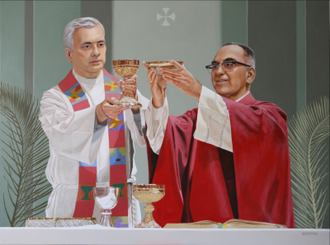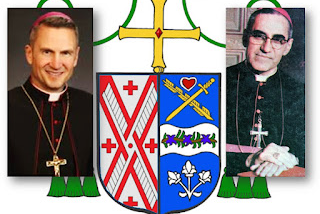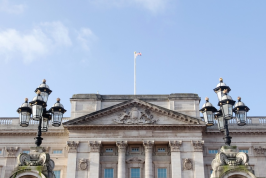Text: Very Rev Dr John Hall at Romero Evensong

The Great Amen by Peter Bridgman
The Very Rev Dr John Hall, Dean of Westminster, gave the following sermon at the Evensong of Thanksgiving for the canonisation of St Oscar Romero at Westminster Abbey on Saturday.
We celebrate today the canonisation of St Oscar Romero, Bishop and Martyr, that took place in Rome on 14th October 2018.
Oscar Romero has been venerated as a martyr here at Westminster Abbey since 1998, when his statue was added to the West Front of the Abbey as one of ten 20th century martyrs from around the world and from all traditions of Christianity. Oscar Romero, Archbishop of San Salvador, was shot dead on 24th March 1980 by a Government hitman, as he celebrated Mass at the altar of the hospital chapel in his see city.
The next day, his martyrdom was acknowledged here in England by Robert Runcie, Archbishop of Canterbury, at his enthronement in Canterbury Cathedral. He interrupted the solemn liturgy to pray at the place of martyrdom in 1170 of his predecessor St Thomas Becket.
On the day of Oscar Romero's canonisation in Rome last month, the former Archbishop of Canterbury, Rowan Williams, led a delegation of ten Anglican bishops. Archbishop Justin Welby wrote to Pope Francis, saying of Oscar Romero, 'as a champion of peace and justice he stood up against oppression and was consistently on the side of the poor, the underprivileged and the marginalised. In this he emphasised and demonstrated the love of Christ himself. Oscar Romero is held in great esteem in the Church of England. May his example of courage and commitment be a model for us all.'
So, what did Romero face in that small Central American country of six million people named after our beloved Saviour, and how did he face up to it?
The history of instability in El Salvador and in the Central American republics from the time of their independence from Spain in 1821 is too complex to recount in this brief moment. But in 1979, on 15th October, a revolutionary government junta, a military dictatorship, that would be followed by others, took power and ruled El Salvador for two and a half years. The purpose of this new junta was to put an end to a revolutionary movement which was already making an impact on the country. The unrest at this time was a replication of an uprising by peasant farmers in 1931, which was crushed by the Salvadoran military and resulted in the deaths of 30,000 people. The 1979 dictatorship was characterised by torture, executions and unexplained disappearances, indeed by mass murder. Such was the context in which Oscar Romero was the Archbishop of the capital city.
What sort of man was he? He was in his 60s as archbishop, having been born in 1917. Having trained for the priesthood and been ordained in Rome, Romero was a parish priest in his home country and became in 1966 secretary of the Bishops' Conference in El Salvador. He was regarded as a conservative, editing a diocesan newspaper that proclaimed the traditional teaching of the Church. In 1970, he was ordained an auxiliary bishop for the diocese of San Salvador and in 1974 became bishop of a poor, rural diocese. Three years later he was Archbishop of San Salvador.
Within three weeks of his inauguration as archbishop, a personal friend of his, a Jesuit priest, Rutilio Grande, who had been creating self-reliance groups amongst the poor, was assassinated with two companions. The following Sunday, Romero allowed only one Mass in the whole diocese - at the Cathedral - where he spoke out against the murders. He later said, 'When I looked at Rutilio lying there dead I thought, if they have killed him for doing what he did, then I too have to walk the same path.'
His death had a profound impact on the archbishop, who now began to speak out against poverty, social injustice, assassinations and torture in a fresh way. His powerful weekly sermons were broadcast on the radio. He became known internationally for his work. For example, he received a doctorate from a Belgian university. 116 British Parliamentarians nominated Archbishop Romero for the 1978 Nobel Peace Prize. In December 1978 the British Parliamentary Human Rights Group sent a delegation to El Salvador made up of the Crossbench Peer, Lord Chitnis, Conservative MP Peter Bottomley and Labour MP Dennis Canavan, with Julian Filochowski, later director of CAFOD and now chair of the Archbishop Romero Trust. During the visit they met with Archbishop Romero and attended his Sunday Mass.
On the feast of the Transfiguration, 6th August 1979, Archbishop Romero issued his fourth pastoral letter, on the Church's mission in the national crisis. He addressed the question whether the Church should be seeking, was indeed seeking, to exercise political power in proclaiming the Gospel's preferential option for the poor. He wrote, 'The Church wants to offer no other contribution than that of the Gospel. It has no purely political contribution to make, nor any merely human skill to offer. Quite truthfully, the Church is interested only in offering the country the light of the Gospel for the full salvation and betterment of men and women, a salvation that also involves the structures within which Salvadorans live.' But his call to the Church to remain faithful, and to enable all Christians to live out their mission truly, became ever more impassioned.
His final sermon concluded with these powerful words, some of which we have just heard in the anthem set to music by Sir James MacMillan, 'I would like to make a special appeal to the men of the army. Brothers, you come from our own people. You are killing your own brothers. The Church, the defender of the rights of God, of the law of God, of human dignity, of the person, cannot remain silent before such an abomination. In the name of God, in the name of this suffering people whose cries rise to heaven more loudly each day, I implore you, I beg you, I order you in the name of God: stop the repression.'
St Oscar Romero's martyrdom in 1980 did not bring to an end the repression and violence in his city and country. Ten years later, more than one million people had been displaced from their homes. Death squad killings and disappearances remained steady, as well as torture, false imprisonment, and attacks on civilians by the Army and security forces. Opposition politicians, members of Church and grassroots organizations representing peasants, women and repatriated refugees suffered constant death threats, arrests, surveillance and break-ins all year. Eventually, by April 1991, negotiations resumed, resulting in a truce that successfully concluded in January 1992, bringing about the war's end. So the suffering went on long after the martyrdom of the archbishop.
How then should we assess, not the political value of his death, but the value for the Church and for the kingdom of God of his steadfastness, his intransigence and his martyrdom?
Tertullian, a Carthaginian Christian convert, whose Latin writings round about the year AD 200 survive in good numbers, reflecting on the persecution of Christians by the Roman Empire, described the blood of the martyrs as the seed of the Church. Rome failed to eradicate the Church; rather it flourished under persecution. The sight of people strong in the faith willing to go to their death rather than deny the Lord has always been influential for good.
The martyrdom of St Oscar Romero was a wicked political act against a man of profound faith and Christian commitment. In the end it would prove worthless politically but fruitful spiritually. The people of El Salvador live now in relative peace, if not in great comfort. Life will always be a struggle.
But the faith of the Church has been confirmed, and Christians throughout the world have been encouraged, by the witness and death of St Oscar Romero, for whom today we profoundly give thanks to almighty God.
See also: Westminster Abbey: Solemn Evensong of Thanksgiving for Canonisation of St Oscar Romero www.indcatholicnews.com/news/36032


















